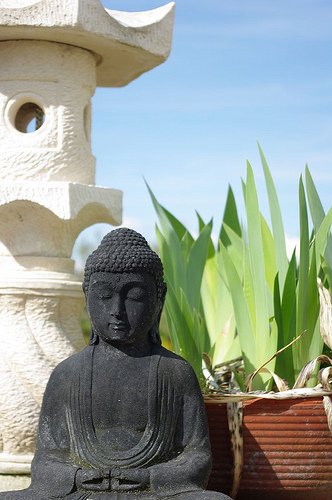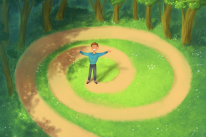“Beware of the half truth. You may have gotten hold of the wrong half.” ~Unknown
The other day, a friend told me how his previous relationship fell apart. His girlfriend failed to disclose a major resentment based on a misconception, and instead initiated a series of arguments over little things until their relationship eventually collapsed under the weight of all that confrontation.
I explained how I practice radical honesty with my boyfriend. Essentially, I disclose everything I think and feel about him that I have trouble resolving in my head, knowing full well most of it has more to do with me.
There are times when I feel annoyed with him, but later discover I was actually angry with myself. There are times I get frustrated with him when there’s nothing he’s done–I’ve just had a difficult day. And there are other times when I doubt him, but soon realize I misinterpreted what he did or said.
A lot of people swallow these passing thoughts and judgments, or push them down to avoid making unnecessary waves. But I’ve found this can eventually lead to a tsunami of emotion when you finally crack and unleash all these unspoken grievances. They become a list of reasons to justify the distance you’ve been creating.
The alternative is to acknowledge what you’re feeling, knowing full well it may have more to do with you than him or her, and in doing so maintain intimacy and trust.
It’s really about being honest with yourself. It’s about recognizing that your mind can play tricks on you sometimes. It’s about realizing that you can be far more rational when you look at your emotions objectively. There may be times when it isn’t all on you–in those situations especially, it’s best to communicate what’s on your mind.
The truth may not always feel polite. It might make you feel vulnerable. It might feel ridiculous to express–which is precisely why it’s so powerful do to it. The best way to free yourself from resentment is to work through it and let it go.

Photo by mhaller1979
About Lori Deschene
Lori Deschene is the founder of Tiny Buddha. She started the site after struggling with depression, bulimia, c-PTSD, and toxic shame so she could recycle her former pain into something useful and inspire others to do the same. You can find her books, including Tiny Buddha’s Gratitude Journal and Tiny Buddha’s Worry Journal, here and learn more about her eCourse, Recreate Your Life Story, if you’re ready to transform your life and become the person you want to be.
- Web |
- More Posts













 Though I run this site, it is not mine. It's ours. It's not about me. It's about us. Your stories and your wisdom are just as meaningful as mine.
Though I run this site, it is not mine. It's ours. It's not about me. It's about us. Your stories and your wisdom are just as meaningful as mine.
My husband and I practice this, we’ve been completely honest from day one. It works for us and I really do think people, especially these days, could use more honesty in their lives. It’s not always easy but keeping things down and hidden makes things a lot harder.
I couldn’t agree more! My boyfriend tells me that he appreciates that he never has to guess what’s on my mind. If something is bothering me, I communicate it and then I’m better able to let it go. It works for us.
I would just like to add that the way in which frustrations are communicated are crutial. If they are expressed in a “knit picking” or “nagging” sort of way, most likely, that is how they’ll be percieved. It sounds like you relay the problems and frustrations that you need to express to your boyfriend in a calm or constructive manner which yields accepting response that you receive.
I think you’re right about that. It makes a big difference whether the intention is to minimize conflict or create unnecessary drama.
After leaving an abusive situation, I found it very difficult to figure out how to have a healthy, normal relationship. The best thing I’ve found is to be completely honest. This has been very hard for me, after learning how to, for years, hide everything about myself. But it has been ultimately very rewarding. I know how patient and compassionate my boyfriend is and because of how he treats me when I tell him how I feel honestly, I know I can trust him. Thanks for this article, sometimes I doubt if I’m “doing it right.”
Hi Jennifer,
I’m glad to hear you’re no longer in this abusive situation, and that
now you feel safe enough to communicate what’s on your mind. You’re right–it does create a sense of trust.
I think a lot of times in relationships, we end up targeting a lot of our feelings (unrelated to the relationship) to the other person. It’s easier to get frustrated with a boyfriend than to acknowledge you’re struggling with low self esteem, or feeling powerless at work. We tend to find outlets for our feelings, and oftentimes that’s the person who we feel closest to.
A lot of people will say they would never do that–and perhaps they wouldn’t. But I think more people do than they realize. It’s just they’ve never stepped back and taken a close look at their actions and motivations. Being honest with ourselves, and feeling comfortable enough to be honest with the people we’re with, in my opinion, is a prerequisite to happiness–both individually and in relationships.
Lori
Hi Lori – do you have anything further to add about why we turn the person who we feel closest to into our outlet? It’s counterintuitive to say the least…
Thank you.
Hi RJ,
I believe we do this because the people in our lives are mirrors for what’s going on inside of us. When we’re feeling frustrated, we see other people as frustrating. When we’re feeling angry, we may think other people are trying to hurt us. This type of thing can happen frequently with the people we’re in relationships with because we spend a lot of time around those people–there are just far more opportunities to do it.
What helps me is to always ask myself, “What’s really going on with me?” I may not be able to answer this right away, but it reminds me to look for the answer within my self.
Lori
Knowing what to disclose and what not to disclose is an issue I’ve faced with each new relationship after the abusive one ended. And I came to the same conclusion you did: honesty is best. My reasoning is that once you’ve gone through a bad relationship, some of that old stuff is bound to come up in different ways: you’re suddenly reminded of something and you grow cold and unresponsive, or you discover that you’ve been behaving in ways that prevent certain circumstances while basically willing others into existence. It can be confusing for a new love to know how the old one affected you (and confusing for us, too!). So simple honesty – which sometimes means you need to get at the root of what’s influencing your mind (radical honesty) – is the best way to build a healthier relationship with your self and with your new love.
Best of luck to you!
Simply leaving an abusive relationship is a great way to be honest with yourself and your situation, so great job! It is hard to be honest with others when you feel trained to hide everything (from your partner and many times friends and family.) I am also learning how to be honest with someone I care deeply for and have started to slowly trust again. It’s hard not to think “am I doing this right?” but there really is no right or wrong way to “do it”, it’s just what feels right for you. You know what a hurtful thing is so now you can fully appreciate and see the beauty of a healthy relationship. I know that being honest is the only way I can be now. Honesty is the most personal kind of freedom there is.
While I believe it’s important to be honest in relationships, I do wonder about disclosing every little thing that may bug me about my husband all the time. Sometimes, I do let minor things go or may put them off for a better time. I also need to be honest about my motives too–that I want to work things out and make things better, not just be mean or knit pick.
This is where I think that self-awareness thing comes in. There are times I feel tempted to knit-pick and then I realize it’s because I am feeling stressed over family issues, or feeling out of control with a work situation. If I can understand what’s really going on with me (why I’m letting a silly little thing bother me) then there’s no need to tell him what’s going on in my head.
You make a great point about waiting for the right time to communicate something. I think that’s part of being respectful–knowing when to share and how.
Perhaps I’m reading this differently than itended. I’m hearing a virtual river of thoughts and emotions being poured upon one’s mate if only to help the pourer process thoughts in a more verbal way. Can we better define a difference between radical honesty and pummeing others with so many of the emotions flowing through us?
My experience has been that ‘stuffing’ feelings and later blowing up leads to much the same stresses and issues as constant venting – Eventually it becomes a drone where everything’s vocalized and quite often what should be an important issue may be minimized, while not so important issues are given too much importance (or used as spring boards to what’s really at issue.)
Maybe there could be a bit more balance or harmony in relationships if people were to sleep on some of these feelings and see if they still feel the same way in the morning. If it’s still something that needs airing, then you’ll have had the time to think it through a bit more and express it clearly with less emotion clouding the issue.
I don’t think that Lori is suggesting we air every little thought and emotion that comes through our head. It’s more like this: my boyfriend will make a random comment about how cute he thinks his friend Autumn is (who lives 500 miles away). This makes me feel very insecure and angry and I know it’s 100% my issue. Normally I would keep this to myself. Radical honesty and the way I want to be means I would let him know this. Then we would discuss it and end up better over all. At least in theory, but I know my boyfriend is very understanding.
Yes, this is a perfect example! This is exactly what I was referring to.
Hi there!
What I do with my boyfriend is communicate the things that I am not able to process in my head (and may otherwise stuff down instead). So by that, I mean that oftentimes I have slept on those things, but for some reason, I am still feeling something I don’t quite understand. Because we have a healthy relationship, this doesn’t manifest in constant venting. It happens occasionally. I think that because of this radical honesty, we have had some very insightful conversations that have minimized the likelihood of future misunderstandings.
I can definitely understand the spirit of your comment. If I were to come to him every evening with a list of things about him that bothered me, our relationship would likely suffer. My goal isn’t to bombard him with constant grievances. It’s to talk through confusing feelings that I may otherwise stuff down–and unnecessarily, since I could have simply worked through them and let them go.
Does that make sense?
Lori
It makes a lot of sense. It may have just been the way I read the article and certain points which struck me more than others – Obviously my own background colors things and I think I’ve sat on all four sides of this fence. = >
Women typically use both sides of our brains at the same time, where as, a lot of men process with one side (logical) and then the other (emotional). When women process emotional things verbally it helps us to better sort out our emotional feelings and balance them with logical thoughts. (i.e., When I heard my man say he thought another woman was attractive, I felt insecure and that made me angry – Where as, when I talked about it, I felt better because I understood he didn’t actually say she was more attractive and he still thinks I’m a hottie.)
I would hope “radical honesty” works both ways in that a boyfriend wouldn’t have to stiffle his own thoughts so as not to provoke his mate’s insecurities by, say, choosing not to tell her that he thought someone was attractive.
Thank you for taking the time to respond and I have to say that I very much enjoy the daily wisdom!
Crystal
I practice radical LOVE in my relationship with my other. Just because something about someone else bothers ME does not mean that I have to share my feelings. The question I always ask myself is, “what is the most compassionate response?” or “will this response ease suffering or increase it?”
Peace,
Phil
Hi Phil,
I love that–radical love. I think that being kind and compassionate is one of the most important things we can do to maintain a loving relationship. That being said, I personally find it very helpful to communicate what’s on my mind when there is something I am having trouble releasing. I am grateful that I am in a loving relationship with a man who actually encourages me to share my feelings when they may be confusing to me. I understand it may not be for everyone, but it’s made such a difference for me and for us.
Peace to you, as well. =)
Lori
I think you miss my point, Lori. Maybe you can ask yourself the question, “when is silence the most compassionate action?”
And now, after that response, I think I will return to silence.
Peace, Phil
Hi Phil,
I did not miss your point. I understand your perspective–that you choose what to say (and not to say) based on what is most compassionate. I think that’s a wonderful practice; I just do things a little differently.
I of course aim to be compassionate, but there are times when I communicate things on my mind with the intention of working through them with my boyfriend because I am struggling with them in my head. Thus far, it has proven to be an effective way of creating a strong, intimate relationship with minimal conflict.
Love and light,
Lori
I think you miss my point, Lori. Maybe you can ask yourself the question, “when is silence the most compassionate action?”
And now, after that response, I think I will return to silence.
Peace, Phil
[…] more here: 7/11/11 Tіnу Wisdom: On Being Hοnеѕt In Relationships | Tіnу ̷… Share and […]
Good post.
There is definitely a fine line between healthy self-disclosure and brutal honesty as a weapon. I love to practice total truth in my relationships, it hurts sometimes-but in the end it feels great knowing that you and whomever have created a safe space to air y’alls dirty laundry!
This concept really hits home. I’ve been unpacking a recent breakup, in part to come to terms with the loss, but also trying to recognize that if I’m going to wallow in it, then I also must use it to prepare myself for the future. It’s amazing, looking back, how resentment flowing in both directions—but left unsaid until it boils over—can create such a wedge. Having a better practice of handling it, using communication that is honest and forthright without being willfully hurtful (because that’s not communicating, really) would’ve really done wonders…thanks for sharing.
I love this piece– very helpful and clarifying. Recently I have found myself in this exact position, holding on to this sort of subconscious resentment fueled by my own mistrust and insecurities. Realizing this and then admitting it to my partner has been crucial in my personal healing process, and in saving our relationship. What I am still struggling with, however, is distinguishing how much of it is really me vs. the emotional results of his past wrongdoings. Am I wrong to feel a certain way? SHOULD I even let go of the past?
I am so grateful that I have true friends that I can screen my thoughts with. That way, no one person is totally burdened by my thoughts and feelings…and I have help figuring out what I need to share with someone.
Lori! You are my heroine. This article is radically honest too. I constantly find myself being drawn to articles on Tiny Buddha and more often than not it is to your writing (even though I’m 4 years out-of-date).
It’s comforting for me to have someone else out there, writing about their experiences, that relate closely to my own personal growth. To recognise in the heat of the moment that my feelings especially my negative ones are based in fear and suffering from my past, is tough for me. To be this honest with myself can take me days, sometimes a week. I often blame the man (whichever man is in my life at the time), and straight away I feel conflict, sub-consciously I know it’s not his fault that I feel bad. Recently I’m trying the “sharing my confusing unable to process feelings” with him and trying hard to do it from a place of love and not fear, without expectation or without the aim of finding a solution. At the moment just sharing is enough. It makes me feel nice. Safer. Less crazy. Thank you for sharing too.
You’re most welcome! I sometimes have a hard time in the heat of the moment too, but I think it gets easier with practice. It does feel a lot safer to share. Suddenly, I don’t feel alone with my confusing emotions, or bad about myself. I feel like a good person who’s dealing with difficult feelings and doing her best to work through them without blaming someone else. I think this also creates trust, because the other realizes you’re trying to take responsibility for your feelings.
Thanks for taking the time to write. =)
Hi all!
I’m just revisiting this post four years later, and I see I missed some comments before. My apologies, and to those who wrote “thank you,” you are most welcome!
Lori